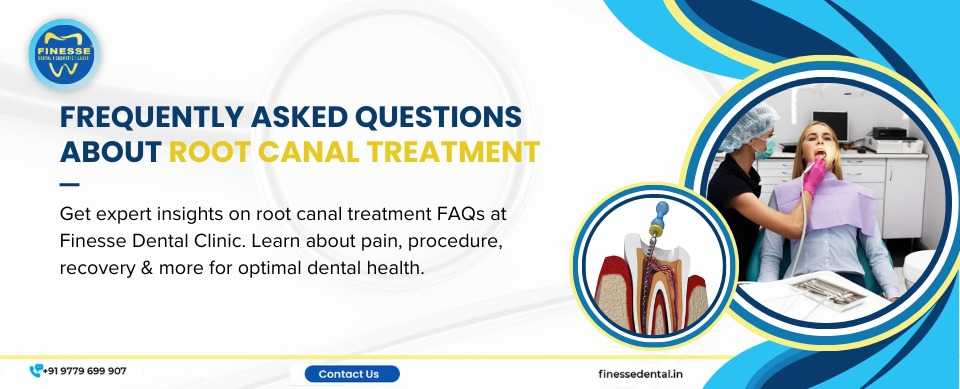- May 22, 2024
- Comment: 0
- Blog
Frequently Asked Questions About Root Canal Treatment
Toothaches are no fun, and the mention of root canal treatment can send shivers down anyone’s spine. However, despite its reputation, root canal treatment is a safe and effective procedure that can save a damaged tooth and alleviate your pain.
This blog from Finesse Dental Clinic aims to answer all your frequently asked questions about root canal treatment, empowering you with information and easing any anxieties you may have.
What is a Root Canal?
A root canal is a dental procedure that removes infected or inflamed tissue (pulp) from the inside of a tooth, including the root canals. The canals are then cleaned, disinfected, and sealed with a filling material to prevent further infection.
Why is Root Canal Treatment Needed?
There are several reasons why a root canal might be necessary:
- Deep Cavity: When a cavity isn’t treated promptly, it can reach the inner pulp of the tooth, causing inflammation and infection.
- Cracked or Fractured Tooth: A crack or fracture can expose the pulp to bacteria, leading to infection.
- Severe Toothache: Persistent pain is a telltale sign of pulp inflammation or infection.
- Swollen Gums: Inflammation or infection can cause swelling and tenderness in the gums around the affected tooth.
What are the Signs and Symptoms
Common signs and symptoms that may point to the need for a root canal treatment include:
- Persistent toothache, especially when biting or chewing
- Sensitivity to hot or cold temperatures
- Discoloration of the tooth
- Swollen or tender gums around the tooth
- A loose tooth
- Formation of an abscess (pimple-like bump) on the gums near the tooth
If you experience any of these symptoms, schedule an appointment with your dentist for a proper diagnosis and treatment plan. Early intervention is crucial to avoid complications and potentially save your tooth.
Is Root Canal Treatment Painful?
Modern dentistry and local anesthesia ensure that root canal treatment is a virtually painless procedure. You may experience some mild discomfort during the injection of the anesthetic, but the actual treatment should be pain-free. Additionally, dentists often prescribe medication to manage any potential post-procedural discomfort.
What Happens During a Root Canal Treatment?
A root canal treatment typically involves the following steps:
- X-ray: Your dentist will take an x-ray to assess the extent of the infection and determine the number of root canals in the tooth.
- Anesthesia: Local anesthesia is administered to numb the area around the tooth.
- Isolation: A rubber dam is placed around the tooth to isolate it and keep the treatment area clean and dry.
- Access and Cleaning: The dentist will create an access point through the tooth’s crown to reach the infected pulp. Using small instruments, they will carefully remove the infected tissue and clean the root canals.
- Shaping and Filling: The canals are then shaped to allow for proper placement of the filling material. An antibiotic medication may be placed within the canals to further combat infection.
- Sealing: The canals are sealed with a specialized dental material to prevent further infection.
- Temporary Restoration: A temporary filling is placed on the tooth to protect it until a permanent crown can be fabricated.
- Permanent Crown: During a subsequent visit, a permanent crown is placed on the tooth to restore its strength, functionality, and aesthetics.
6. How Long Does a Root Canal Treatment Take?
The duration of a root canal treatment can vary depending on the complexity of the case. It usually takes one to two appointments to complete the procedure. However, some complex cases may require additional appointments.
7. What is Recovery Like After a Root Canal Treatment?
Following a root canal treatment, you may experience some mild discomfort or sensitivity in the treated tooth. This can be managed with over-the-counter pain medication as prescribed by your dentist. Most patients experience a complete recovery within a few days.
It’s important to maintain good oral hygiene and avoid chewing hard foods on the treated tooth until the permanent crown is placed.
8. How Long Does a Tooth Last After Root Canal Treatment?
With proper care and follow-up appointments, a tooth that has undergone root canal treatment can last a lifetime. Maintaining good oral hygiene, regular dental checkups, and avoiding excessive chewing force on the treated tooth are crucial for long-term success.
9. Are There Alternatives to Root Canal Treatment?
In some cases, depending on the severity of the infection and the condition of the tooth, an extraction might be considered an alternative to a root canal. However, whenever possible, dentists prioritize saving the natural tooth.
At Finesse Dental Clinic, we understand that undergoing any dental procedure can cause anxiety. Our team of experienced and compassionate dentists are dedicated to providing a comfortable and stress-free experience for our patients. We utilize advanced technology and gentle techniques to ensure the most efficient and painless root canal treatment possible.
We believe in open communication and patient education. We will thoroughly explain the procedure, address any concerns you may have, and answer all your questions before, during, and after your treatment.
Here are some additional benefits of choosing Finesse Dental Clinic for your root canal treatment:
- Modern Technology: We utilize state-of-the-art equipment, including digital x-rays and rotary instrumentation, for precise and efficient treatment.
- Comfortable Environment: Our clinic is designed to provide a relaxing and comfortable atmosphere to alleviate any anxiety you might feel.
- Flexible Scheduling: We offer flexible appointment times to accommodate your busy schedule.
- Multiple Payment Options: We understand that dental care costs can be a concern. We offer various payment options to make your treatment affordable.
Schedule an Appointment Today!
Don’t let a toothache control your life. If you suspect you need a root canal treatment, don’t hesitate to contact Finesse Dental Clinic. Schedule an appointment today for a consultation and let our experienced team help you achieve a pain-free and healthy smile.

